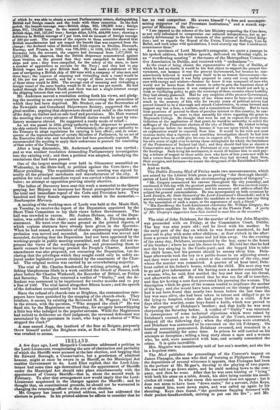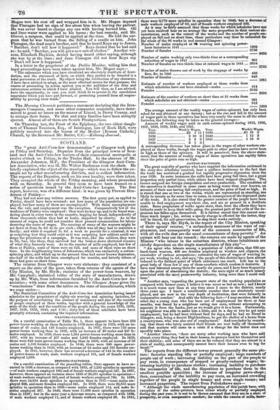IRELAND.
A few days ago, Lord Morpeth's Committee addressed a petition to the Lord-Lieutenant, recapitulating the acts of obstruction and partiality of which the Sheriffs were accused at the late election, and begging that Sir Edward Borough, a Conservative, but a gentleman of admitted honour, might at once be sworn in as Sheriff, as the Municipal Act enables Government to do. Lord Eliot replied, that the Lord-Lieu- tenant had some time ago determined that the appointment of Sheriffs under the Municipal Act should take place simultaneously with the appointment of County Sheriffs—that is, about the second week in February. To alter that arrangement now would imply that the Lord- Lieutenant acquiesced in the charges against the Sheriffs ; and he thought that, on constitutional grounds, he should not be warranted in changing the returning-officer on the eve of an election. Mr. Gregory has issued a printed address, and has addressed the electors in person. In his printed address he affects to consider that he has no real competitor. He avows himself "a firm and uncompro- mising supporter of our Protestant institutions," and a stanch sup- porter of Ministers. He adds- " I am opposed to the scheme of the late Ministry respecting the Corn-laws, as not only calculated to compromise our national independence, but as pe- culiarly detrimental to the best interests of this portion of the United King- dom ; and as regards the Repeal of the Union, Universal Suffrage, Vote by Ballot, and such other wild speculations, I need scarcely say that 1 could never countenance them."
As a specimen of Lord Morpeth's antagonist, we quote a passage in his spoken address, his maiden speech, delivered on Monday night, to • an "overflowing meeting" at the rooms of the Metropolitan Conserva- tive Association in Dublin, and received with "enthusiasm "-
In the event of being chosen the representative of the city of Dublin, of which he had no doubt, it would be his first object to support the present Go-
vernment, not because it was the present Government, but because he con- scientiously believed it would prove itself to be an honest Government—be- cause he was convinced it was fully prepared to carry out every useful mea-
sure with energy and wisdom—because he knew it was composed of men who
would not be borne from their course in order to gain the transient shout of popular applause—because it was composed of men who would not seek by a
weak or vacillating policy to gain the contempt of those enemies whose hostility they had already possessed. Had he any suspicion of the present Government, he owed too much to the memory of one whose name he bore—he owed too much to the memory of him who for twenty years of political service had proved himself to be a thorough and stanch Conservative, to come forward and support any but a firm, a resolute, and a conscientious Ministry. But to turn from questions of general to those of peculiar interest to this country, he con- ceived it necessary to state to that assembly his views regarding the grant to Maynooth College. He thought that were be not to express his great dissa- tisfaction at the application of that grant, he would be unworthy to solicit the suffrages of the Protestant electors of the city of Dublin. He wished to bring that question before the meeting, because it was one upon which he was sure an explanation would be expected from him. It would he his wish and most
anxious desire that a rigorous and searching investigation should be had into that grant before he could give his vote in support of it. He owed too much to
his own sense of right ever to-betray those strongholds for which the forefathers of the Protestants of Ireland had bled ; and they should find him as sincere a Conservative and as true-hearted a Protestant as ever appeared before them at
the hustings. Such being his sentiments, it would ill become him to omit pay- ing a tribute of respect to those noble men who have of late years met with so bad a return from their countrymen, for whom they had devoted their lives, itheirld
their and fortunes—he meant the clergymen of the Established Church n l
And so forth.
The Dublin Evening Mail of Friday made two announcements, which are seized by the Liberal Irish press as proving "the thorough identifi- cation of Lord De Grey with the electioneering prospects of Gregory"— "Mr. Gregory commenced his canvass throughout the city yesterday, and continued it this day with the greatest possible success. He was received every- where with warmth and enthusiasm ; and his manners and address afford the subject for general commendation. He was accompanied on both occasions by Lord Jocelyn, the State Steward of the Lord-Lieutenant's Household; and it is scarcely necessary to say that neither the candidate or the cause lost any thing by the association of such a name, or the appearance of such a friend." "His Excellency the Lord-Lieutenant entertains Mr. William Gregory, the Conservative candidate for this city, this day at the Phoenix Park. A party of Mr. Gregory's supporters have been invited to tneet him on the occasion.
The trial of John Delahunt, for the murder of the boy John Maguire, was proceeded with on Friday, at the Commission Court, Dublin. The boy was nine years old ; and be lived with his mother. In the early part of the day on which he was found murdered, he had gone out to play with some other children : at four o'clock in the after- noon a person called him by name and led him away. On the evening of the same day, Delahunt, accompanied by the boy, came to the house of his brother ; where he met his sister-in-law. He told her that he had met the boy straying in the Castle-yard; and she begged him to take the child home, lest his parents should be uneasy about him. Dela- hunt afterwards took the boy to a public-house in an adjoining street ; and they were next seen in a street at the extremity of the city, near where the murder was committed. A quarter of an hour later, Dela- hunt called at his father's house, without the child. His next step was to go and give information of his having seen a murder committed by a woman, who, he said, first scolded the boy and then cut his throat, and afterwards ran off. He stated that he was too far off to interfere, and that his having a sore foot prevented his pursuing the woman. The description which he gave of the woman tended to implicate the mother of the boy ; and she would have been arrested on the charge of murder, had it not been found that nearly two hours before the last time the boy was seen alive, she had been taken in labour and obliged to go to the lying-in hospital, where she had given birth to a child. A few days after the murder, some boys found a knife, which was proved to be the property of Delahunt's brother ; and that knife he was seen sharpening the Saturday before. A verdict of" Guilty" was returned. In consequence of some technical objections which were raised by Delahunt's counsel, as to the jurisdiction of the Court, sentence was delayed till the following day ; when the objections were overruled, and Delahunt was sentenced to be executed on the 5th February. On hearing sentence pronounced, Delahunt swooned, and remained in a state of insensibility for some time. In prison he still carried on his attempts at deception ; telling a long story about a man and a woman who, he said, were associated with him, and actually committed the crime. It is quite incredible.
Mrs. Maguire was incautiously told of her son's murder, and she lies in a hopeless state.
The Mail publishes the proceedings of the Coroner's inquest on James Flanagan the man who died of burning at Philipstown. From the depositions of several witnesses it appears, that Flanagan had been in the parlour at Mr. Mfgan's, dancing to the playing of two pipers. He was told to go down stairs, and he staid making bows to the com- pany, and then he went. After that he was seen leaning or " lying " with both his arms on a table, drunk, his shirt being outside his small- clothes all round. In what room this occurred does not appear ; but it does not seem to have been "down stairs," for a servant, John Keys, who roused him, went down stairs, and was called up again by his shouting. Keys then found." the gentleman flapping deceased with their pocket-handkerchiefs, striving to put out the fire " ; and Mr.
Magan tore his coat off and wrapped him in it. Mr. Megan deposed that Flanagan had no sign of fire about him when leaving the parlour. He was never heard to charge any one with having burned him. Oil and lime-water were applied to his burns ; the best remedy, said Mr. Glover, a surgeon, that could be applied at the time. He told the sur- geon that he was burned from the falling of a candle on him. John Flanagan, the dead man's brother, said that he heard Keys say to James, "Butcher, don't tell how it happened." Keys denied that he had said so : he said, "Butcher, you will geta new suit of clothes." Another wit- ness, Elizabeth Hopkins, denied having heard either saying, although she was by at the time; and Jane Flanagan did not hear Keys say "Don't tell how it happened."
In a letter to the proprietor of the Dublin Monitor, telling him that legal proceedings have been taken against him, Mr. Mogan says- " The calumnies which you have circulated are absolutely destitute of foun- dation, and the statement of facts on which they profess to be fohnded is a total perversion of the truth. My object being the vindication of my character, I have been advised to adopt, as the most effectual means for that purpose, the course of proceeding by action against you as the publisher of the false and calumnious articles to which I have alluded. You will then, as I am advised, have the opportunity, in case you shall think fit to persist in the scandalous aspersions which you have put forward, of protecting yourself from all respon- sibility by proving their truth."
The Morning Chronicle publishes a statement declaring that the Iron- mongers Company, and some other companies conjointly, have deter- mined to grant no leases on the manor of Lizard, in Derry County, and to enlarge their farms. To that end sixty families have been abruptly ejected. Almost all of them are Scotch Presbyterians.
On Thursday last, the Feast of the Epiphany, the two eldest daugh- ters of Thomas Tennison, Esq., of Inistiogne, late of Rock Hall, were • publicly received into the bosom of the Mother [Roman Catholic]
• Church, by the Reverend Mr. Butler, C.C.-Kilkenny Journal.



























 Previous page
Previous page